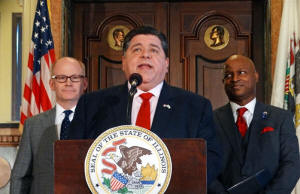Pritzker, legislative Democrats announce budget agreement
 Send a link to a friend
Send a link to a friend
[April 08, 2022]
By PETER HANCOCK
Capitol News Illinois
phancock@capitolnewsillinois.com
 SPRINGFIELD – Gov. JB Pritzker and
Democratic leaders of the General Assembly announced Thursday they had
reached agreement on a $45.6 billion budget package that would include
$1.8 billion of mostly-temporary tax relief. SPRINGFIELD – Gov. JB Pritzker and
Democratic leaders of the General Assembly announced Thursday they had
reached agreement on a $45.6 billion budget package that would include
$1.8 billion of mostly-temporary tax relief.
Senate President Don Harmon, of Oak Park, and House Speaker Emanuel
“Chris” Welch, of Hillside, said they expect a vote on the bills Friday,
the last scheduled day of the 2022 spring session.
“Over the last few weeks, and especially over the last 48 hours, we
engaged in a true give and take, which led to genuine compromise,”
Pritzker said during a hastily-called news conference outside his
office. “And it honestly helped that we all came into this process
committed to a fiscally responsible spending plan that improved our
state's finances and helped our people in an hour of genuine need.”
The overall spending plan had been negotiated between the two chambers,
merging three tax relief proposals that were offered by the governor and
the two chambers at various points this session.

In his budget address in February, Pritzker proposed a $1 billion tax
relief package that he said was aimed at softening some of the impact of
inflation, which is running at its fastest pace in 40 years.
That included a one-year suspension of the state’s 1 percent tax on
groceries, a pause in the scheduled inflationary increase in the state’s
motor fuel tax, and a doubling of the state’s property tax rebate for
homeowners.
Over the ensuing weeks, however, Democrats in both chambers of the
General Assembly upped the ante, with the House proposing $1.3 billion
in relief and the Senate raising that to $1.8 billion.
Those proposals were made possible by higher-than-expected revenue
collections that will leave the state with a projected surplus at the
end of this year.
The final package announced Thursday includes the governor’s proposal
and a mix of the House and Senate add-ons. Those include:
Suspending the 1 percent grocery tax for one year, saving consumers $400
million. Proceeds of that tax go to local units of government, but the
plan calls for replacing that revenue with state funds.
Freezing the inflationary increase in the motor fuel tax for six months,
instead of the one year that Pritzker proposed, saving consumers $70
million. That money, which is earmarked for road and bridge projects,
would be replaced with other state funds.
Doubling the property tax rebate to qualifying homeowners, up to $300
per household.

[to top of second column]
|

Gov. JB Pritzker, flanked by Senate President Don
Harmon, left, and House Speaker Emanuel “Chris” Welch, announce
they’ve reached agreement on a budget and tax relief package that
lawmakers are expected to vote on Friday. (Capitol News Illinois
photo by Peter Hancock)
 Permanently expanding the earned income tax credit
to 20 percent of the federal credit, up from 18 percent, at a cost
of roughly $100 million per year.
Direct tax rebates to taxpayers of $50 per individual and $100 per
child, up to three children per family, with incomes below $200,000
for individuals and $400,000 for joint filers.
And a suspension of the state sales tax on back-to-school purchases
for a limited period in August, reducing those revenues by $50
million.
In addition to those measures, the budget package calls for setting
aside $1 billion in the state’s “rainy day” fund, officially known
as the Budget Stabilization Fund, and spending an additional $200
million to pay down the state’s unfunded pension liability. Those
measures are in addition to the debt repayment package that Pritzker
signed into law in March.
Republicans criticized the package for offering mostly temporary
relief, noting that the tax rebates will likely arrive just before
Election Day while the suspension of the motor fuel tax hike will go
away on Jan. 1.
Senate Republicans outlined their own proposal Thursday, calling for
$2.2 billion in permeant relief by eliminating the sales tax on
groceries and prescription drugs; capping the retail sales tax on
motor fuel; doubling the senior income tax exemption to $2,000;
doubling the income tax credit on property taxes to 10 percent; and
offering various other tax credits.
“Right now, we're seeing record-high inflation. It's certainly over
what we've seen over the past few years,” Senate Minority Leader Dan
McConchie, R-Hawthorn Woods, said during a news conference.
“Families are hurting, but what we need to do is have this on an
ongoing basis, not as some of the (Democratic) plan proposals are,
having checks arrive just before the election and then tax
reductions expire right after the election.”

Welch, however, defended the package, saying he expects some
Republican support and noting that budget deals typically don’t come
together this early in the year.
“We have been very intentional about getting a budget out early,
allowing you all and the Republicans to participate,” he told
reporters. “They (Republicans) printed it out. They've read it. They
participated in a budget hearing (Wednesday). We invited them to a
meeting today (Thursday) where they had no questions whatsoever. And
in committee yesterday, they supported unanimously the revenue
proposals that are being talked about here today.”
Capitol News Illinois is a nonprofit, nonpartisan
news service covering state government that is distributed to more
than 400 newspapers statewide. It is funded primarily by the
Illinois Press Foundation and the Robert R. McCormick Foundation. |